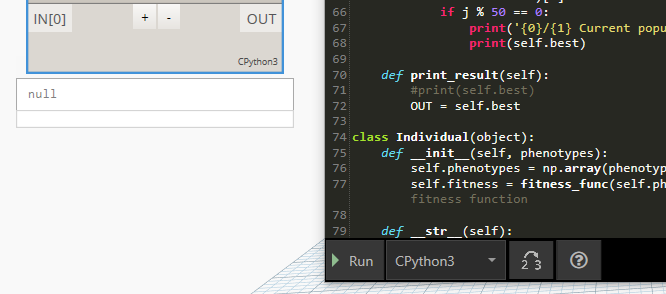Hi everyone,
I am trying to utilize a metaheuristic technique called SOS to do optimization inside Dynamo, and Python.
However, I can not release the output of calculation in Python inside Dynamo, as below:
It would be nice if Dynamo can release similar output as shown by utilizing Visual Studio Code, as below:
Here I upload the code if you want to test:
SOS Code.py (4.3 KB)
Feel free to reply if you have any idea about this.
Thanks
Instrad of using print(), use the syntax OUT = variable. The Python nodes in dynamo always function in that manner, so print function doesnt really get used in this context.
1 Like
Hmm, I’ve put OUT statement, but it is located inside of “def” (line 72). Unfortunately still does not work, as below:

I think there is a difference for Python inside Dynamo
anyway, thank you for your reply

import numpy as np
class SOS(object):
def __init__(self,
l_bound,
u_bound,
population_size,
fitness_vector_size):
self.l_bound = l_bound
self.u_bound = u_bound
self.population_size = population_size
self.fitness_vector_size = fitness_vector_size
self.population = None
self.best = None
def float_rand(self, a, b, size=None):
return a + ((b - a) * np.random.random(size))
def generate_population(self):
population = self.float_rand(self.l_bound, self.u_bound, (self.population_size, self.fitness_vector_size))
self.population = np.array([Individual(p) for p in population])
self.best = sorted(self.population, key=lambda x: x.fitness)[0]
def mutualism(self, a_index):
b_index = np.random.permutation(np.delete(np.arange(self.population_size), a_index))[0]
b = self.population[b_index]
a = self.population[a_index]
bf1, bf2 = np.random.randint(1, 3, 2) # benefit factor1
array_rand = np.random.random(self.fitness_vector_size)
mutual = (a.phenotypes + b.phenotypes) / 2
new_a = a.phenotypes + (array_rand * (self.best.phenotypes - (mutual * bf1)))
new_b = b.phenotypes + (array_rand * (self.best.phenotypes - (mutual * bf2)))
new_a = Individual([self.u_bound if x > self.u_bound
else self.l_bound if x < self.l_bound else x for x in new_a])
new_b = Individual([self.u_bound if x > self.u_bound
else self.l_bound if x < self.l_bound else x for x in new_b])
self.population[a_index] = new_a if new_a.fitness < a.fitness else a
self.population[b_index] = new_b if new_b.fitness < b.fitness else b
def commensalism(self, a_index):
b_index = np.random.permutation(np.delete(np.arange(len(self.population)), a_index))[0]
b = self.population[b_index]
a = self.population[a_index]
array_rand = self.float_rand(-1, 1, self.fitness_vector_size)
new_a = a.phenotypes + (array_rand * (self.best.phenotypes - b.phenotypes))
new_a = Individual([self.u_bound if x > self.u_bound
else self.l_bound if x < self.l_bound
else x for x in new_a])
self.population[a_index] = new_a if new_a.fitness <= a.fitness else a
def parasitism(self, a_index):
parasite = np.array(self.population[a_index].phenotypes)
b_index = np.random.permutation(np.delete(np.arange(len(self.population)), a_index))[0]
b = self.population[b_index]
parasite[np.random.randint(0, self.fitness_vector_size)] = self.float_rand(self.l_bound, self.u_bound)
parasite = Individual(parasite)
self.population[b_index] = parasite if parasite.fitness <= b.fitness else b
def proceed(self, steps):
for j in range(1, steps + 1):
for i, val in enumerate(self.population):
self.mutualism(i)
self.commensalism(i)
self.parasitism(i)
self.best = sorted(self.population, key=lambda x: x.fitness)[0]
if j % 50 == 0:
print('{0}/{1} Current population:'.format(j, steps))
print(self.best)
def print_result(self):
print(self.best)
return self.best
class Individual(object):
def __init__(self, phenotypes):
self.phenotypes = np.array(phenotypes) # phenotype
self.fitness = fitness_func(self.phenotypes) #fitness function
def __str__(self):
return '{0} = {1}'.format(self.phenotypes, self.fitness)
def fitness_func(arg_vec):
s1 = (sum(arg_vec) - sum(x*x for x in arg_vec)) * sum(np.cos(x) for x in arg_vec)
s2 = 4 / (np.sqrt(np.abs(np.tan(sum(arg_vec))))) + int(sum(x*x for x in arg_vec))
return s1 / s2
interval = (-1, 1)
pop_size = 50 # candidate solutions
max_iter = 500 # iterations
dim = 5 # problem variables
sos = SOS(interval[0], interval[1], pop_size, dim)
sos.generate_population()
print('Initial population')
for ind in sorted(sos.population, key=lambda x: x.fitness):
print(ind)
max = sos.proceed(max_iter)
print('--------------------------')
OUT= np.asarray(sos.print_result() ).tolist()
2 Likes
Print statements in current builds should show up in the Dynamo console. Hit Shift+Up arrow to pull that open.
5 Likes
Hello,
the OUT variable must be declared (and set) in the global namespace
3 Likes
Thank you @RMohareb , It works.
Besides, thank you for your insights @jacob.small and @c.poupin
1 Like





